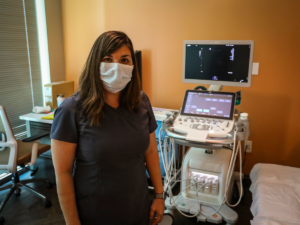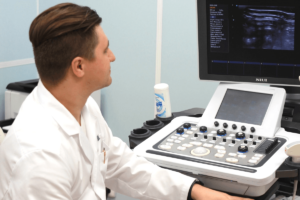Over the next few years, your decision to pursue a career as an ultrasound technician can be influenced significantly by the costs associated with your education. In 2024, it’s crucial for you to grasp the various expenses, from tuition fees to additional costs like materials and certifications.
This comprehensive guide will equip you with the knowledge to navigate the financial landscape of ultrasound tech school, enabling you to create a budget, explore affordable options, and make well-informed choices for your future career.
Understanding Ultrasound Technology as a Career

Before you begin on your journey in ultrasound technology, it’s important to grasp the fundamentals of this rewarding career path. By understanding the nature of the work involved and the opportunities available, you will be better equipped to make decisions regarding your educational investments and future career goals.
The Role of an Ultrasound Technician
Ultrasound technicians, also known as sonographers, play a critical role in the healthcare sector by performing diagnostic imaging examinations. You will operate ultrasound equipment, produce images, and collaborate with physicians to interpret results, ensuring optimal patient care and accurate diagnoses.
Ultrasound technicians must possess a solid understanding of anatomy, physiology, and equipment operation. Your expertise will contribute to assessing patients, understanding their medical history, and providing comfort during procedures. Importantly, you will need strong communication skills to explain processes to patients and relay findings to physicians, making your role integral in the healthcare team.
Benefits of a Career in Ultrasound

A career in ultrasound offers numerous benefits, including job stability, competitive salaries, and the satisfaction of helping others. As the demand for healthcare services continues to rise, skilled ultrasound technicians are increasingly sought after, making this a wise investment in your future.
Career prospects in ultrasound are promising, with the Bureau of Labor Statistics projecting a growth rate of 12% for ultrasound tech jobs from 2020 to 2030. Additionally, as you gain experience and improve your skills, you may find opportunities for specialization as well as advancement within the healthcare field.
This makes a career in ultrasound both fulfilling and financially rewarding, allowing you to make a positive impact on patients’ lives while enjoying a sustainable profession.
Factors Influencing Ultrasound Tech School Costs
Now, understanding the factors that influence the costs of ultrasound tech school can help you make informed choices. Key elements include:
- Location of the school
- Type of program (Certificate, Associate, Bachelor’s)
- Institution type (Public vs. Private)
Any one of these elements can significantly impact your overall expenses, so it’s crucial to consider each carefully.
Location of the School
Ultrasound tech programs vary in cost depending on their geographical location. Schools in urban areas tend to have higher tuition fees and living expenses than those in rural regions. Additionally, you might encounter differences in costs based on the state or region’s economic conditions. When budgeting for this journey, take into account the cost of living in the area near your chosen school.
Type of Program (Certificate, Associate, Bachelor’s)

Factors influencing your educational path include the type of program you pursue, with options ranging from certificates to bachelor’s degrees. Each level offers a different investment in terms of tuition and program length, which directly affects your overall costs.
Bachelor’s degree programs typically require a greater financial commitment than certificate or associate programs, as they often last four years compared to one to two years for the others. However, they may provide broader educational experiences and potentially higher earning potential in the long run, making your investment worth considering.
Institution Type (Public vs. Private)
Any choice between a public and private institution can also influence your expenses. Generally, public schools offer lower tuition rates, particularly for in-state residents, while private institutions often have higher fees but might provide more specialized programs or smaller class sizes.
For instance, public universities may charge significantly lower tuition, especially for residents, leading to substantial savings. In contrast, private schools may offer scholarships or financial aid packages that can offset their higher costs, making them an appealing option for certain students.
Ultimately, assessing your priorities will help you choose the institution that aligns best with your financial situation and career goals.
Tuition Fee Breakdown
After deciding to pursue a career as an ultrasound technician, understanding the tuition fees associated with your education is crucial. You’ll encounter a range of costs depending on the program you choose, so it’s important to familiarize yourself with these figures as you plan your financial investment in your future.

Average Tuition Costs Across the U.S.
Breakdown of average tuition costs for ultrasound technician programs across the U.S. typically ranges from $5,000 to $30,000, depending on the institution and program length.
While community colleges may offer lower tuition rates, four-year programs often come with higher costs. This variability means it’s important to research various institutions to find one that fits your budget while providing quality education.
Cost Variations by Program Tier
Breakdown of costs often corresponds to the tier of the program you choose. Certificate programs, associate degrees, and bachelor’s degrees each present distinct price points, with certificate programs generally being the most affordable, while bachelor’s programs can be quite expensive. It’s important to weigh the potential return on investment in relation to your educational choice.
Understanding these cost variations can help you make an informed decision that aligns with your career goals. Certificate programs, for example, may provide quicker entry into the workforce at a lower cost, while bachelor’s degrees might offer broader opportunities for advancement.
Evaluating the potential salary benefits of each educational tier can be important in justifying the expense, so consider your long-term aspirations when making your choice.
Additional Tuition Considerations
Breakdown of additional tuition considerations includes factors like registration fees, textbook costs, and lab fees, which can significantly increase your overall expense. It’s vital to account for these costs in your budget to avoid surprises as you progress through your studies.
It’s important to note that financial aid, scholarships, and payment plans may help offset these additional expenses. Be proactive in exploring available options, and don’t hesitate to engage with your school’s financial aid office for guidance.
Moreover, understand that while education can be a significant investment, it can also provide substantial returns in terms of employment opportunities and salary potential in the ultrasound field.
Additional Expenses to Consider

To effectively prepare for your journey as an ultrasound technician, it’s imperative to account for additional expenses beyond tuition. These costs can add up quickly and may include supplies, books, and lab fees, impacting your overall budget.
Understanding these potential expenses will enable you to create a more comprehensive financial plan, ensuring a smoother transition into your studies and future career.
Required Supplies and Equipment
Required supplies for ultrasound tech programs may include specialized clothing, diagnostic tools, and personal items necessary for your education. While some schools may provide specific equipment, you should be prepared to invest in imperative items that will help enhance your learning experience. Researching and budgeting for these supplies early on can alleviate financial stress as you begin your studies.
Books and Study Materials
On top of tuition and supplies, you need to consider the cost of books and study materials. Each ultrasound tech program will require various textbooks and online resources to help you grasp key concepts and techniques. Planning for these expenses will ensure you have the necessary materials to excel in your courses.
For instance, the average cost of textbooks for healthcare programs can range from $300 to $600 per semester. Moreover, online resources or supplemental materials may also incur additional fees. To save money, consider exploring used books or digital versions, which can significantly reduce your overall costs while still providing the information you need for your education.
Lab and Clinical Fees
Expenses related to lab and clinical components of your ultrasound tech training can also accumulate. Many programs charge fees for access to equipment, lab usage, and hands-on training experiences, which are crucial for developing your skills as a technician.
Supplies for lab sessions, such as ultrasound gel and other materials, may also contribute to these fees. Additionally, some programs may require you to pay for specific clinical placements or background checks, which are vital for your hands-on training experience.
Make sure to review your program’s fee structure to accurately budget for these imperative costs associated with your ultrasound technician education.
Living Expenses and Financial Planning

All aspiring ultrasound technicians must account for living expenses as part of their financial planning. Besides tuition fees, costs associated with housing, transportation, food, and miscellaneous expenses can significantly impact your overall budget.
Understanding these costs will empower you to manage your finances effectively and invest wisely in your education. By preparing for these expenses ahead of time, you can minimize financial stress and focus on your studies.
Housing Costs
On average, housing costs can vary widely depending on your location and lifestyle choices. Whether you decide to rent an apartment, share housing, or live off-campus, it’s crucial to factor these costs into your overall budget. Depending on the city and amenities, monthly rent can range from $700 to well over $1,500, so you’ll want to choose an option that suits your financial situation.
Transportation Expenses
One important expense you’ll need to consider is transportation. Whether you own a vehicle or rely on public transportation, these costs can add up quickly. Budget for gas, insurance, maintenance, or transit fares based on your travel requirements for class and clinical placements.
Expenses related to transportation also encompass potential parking fees, tolls, and the general wear-and-tear on your vehicle. If you attend classes or clinical sites spread across a city, commuting costs can become a significant part of your budget. Researching transport options and planning your routes can help you save money and time.
Food and Miscellaneous Costs
Food expenses are another crucial part of your living costs. Budgeting for groceries and meals allows you to maintain a healthy diet while managing your expenses effectively.
Miscellaneous costs may include supplies, textbooks, and personal items that are necessary for your daily life as a student. These expenses can vary but planning for them in advance will aid you in maintaining a balanced budget throughout your ultrasound tech education. Allocate a monthly amount for these additional costs to avoid unexpected financial strain.
Online vs. Traditional Programs

Not all ultrasound tech programs are created equal, especially when you compare online and traditional formats. Each option has distinct features that may align with your personal learning style, schedule, and career goals. Understanding the differences can help you choose the best educational path to enter the field of ultrasound technology.
Cost Differences
Cost varies significantly between online and traditional ultrasound programs. Typically, online programs may offer lower tuition rates and reduced expenses for commuting and materials. However, it’s necessary to consider additional costs, such as technology fees or hands-on training requirements, which might be more prominent in an online setting.
Advantages and Disadvantages of Each Program
To make an informed choice, consider the advantages and disadvantages of both online and traditional programs. Traditional programs offer structured environments with direct access to instructors and hands-on experience, while online programs provide flexibility and convenience, allowing you to study at your own pace.
The choice between online and traditional formats really comes down to your individual preferences and circumstances. If you thrive in a classroom setting and benefit from in-person guidance, a traditional program may suit you better. Conversely, if you require a flexible schedule or want to save on commuting costs, an online program could be more advantageous.
Accreditation and Recognition
Programs that are accredited ensure you receive quality education recognized by employers in the ultrasound field. It’s crucial to check if your chosen program meets accreditation standards, as this can significantly impact your job prospects after graduation.
With the increasing demand for qualified ultrasound technicians, attending an accredited program not only enhances your knowledge but also adds credibility to your qualifications. Employers often prefer candidates from recognized institutions, so it’s necessary to verify the program’s standing before enrollment to ensure you invest wisely in your future career.
Financial Aid Options

Despite the financial challenges you may face when pursuing an ultrasound technician career, various financial aid options are available to help ease your burden.
It’s necessary to explore these resources to optimize your educational investment and focus on your studies without the stress of overwhelming debt.
Federal and State Grants
Federal grants, such as Pell Grants, provide financial assistance based on your financial need and do not require repayment. Many states also offer grant programs to support residents’ education in healthcare fields, making these options valuable in reducing your overall schooling expenses.
Scholarships Specific to Ultrasound Programs
Scholarships specifically tailored to ultrasound technician programs can significantly alleviate your tuition costs. These scholarships often consider academic performance, financial need, and even demographic factors, providing a more targeted approach to support your education in this specialized field.
State and local organizations often offer these scholarships to promote careers in healthcare, specifically ultrasound technology. Be sure to research various scholarship opportunities within your state and reach out to your prospective schools for guidance on available scholarships, application deadlines, and eligibility criteria that can help you fund your education effectively.
Work-Study Programs
Grants can be a necessary component of work-study programs, allowing you to earn money while attending school. These programs often partner with schools to provide job opportunities that match your field of study, helping to offset living expenses and potentially reducing your overall tuition costs.
Understanding work-study programs gives you a chance to gain practical experience in the ultrasound field while supporting your education financially. By participating in such programs, you can develop valuable skills and make professional connections that may benefit your future career.
Checking with your school’s financial aid office can help you identify available work-study positions suited to your schedule and career goals.
Student Loans and Repayment Options
Once again, navigating the complexities of student loans can be overwhelming as you pursue your dream of becoming an ultrasound technician. With rising tuition costs, it’s vital to explore the different loan options available to you, along with strategies for managing repayment effectively.
Types of Student Loans
For your journey into ultrasound tech education, you’ll encounter several types of student loans:
- Federal Direct Loans
- Federal Perkins Loans
- Private Student Loans
- PLUS, Loans for Parents
- Income-Driven Repayment Options
Thou should carefully evaluate these options to determine which aligns best with your financial situation.
| Loan Type | Features |
| Federal Direct Loans | Fixed interest rates, flexible repayment plans. |
| Federal Perkins Loans | Low-interest rates, need-based aid. |
| Private Student Loans | Variable interest rates, based on credit score. |
| PLUS, Loans for Parents | Higher loan limits but interest rates apply. |
| Income-Driven Repayment | Payments adjusted based on income. |
Managing Loan Debt
Repayment of student loans can feel daunting, but developing a proactive approach is key. Keeping track of your expenses and creating a budget allows you to allocate funds effectively towards your loan payments.
Loans often accumulate interest, which can significantly increase the total amount owed if not managed properly. By staying organized and regularly reviewing your financial situation, you can ensure a more manageable repayment process and avoid potential financial pitfalls.
Repayment Plans and Forgiveness Programs
Loans come with various repayment plans designed to ease your financial burden after graduation. Understanding these options can help you find the best fit for your income level and future goals.
Plans for student loan repayment include standard, graduated, and income-driven options. Additionally, certain programs, such as Public Service Loan Forgiveness (PSLF), can help you discharge your loans after a specified period of qualifying payments, potentially providing substantial relief if you choose to work in public service or non-profit organizations after completing your degree.
Return on Investment (ROI) Analysis

For those considering ultrasound tech school, understanding the return on investment (ROI) is vital.
Evaluating how your educational expenses translate into future earnings can help you make informed decisions about your career path.
By analyzing potential salary gains against costs, you can assess whether pursuing this training is a financially sound move, ensuring your investment in education yields favorable long-term financial outcomes.
Expected Salary for Ultrasound Technicians
Investment in ultrasound tech education can lead to a competitive salary, providing significant returns. On average, ultrasound technicians earn around $75,000 annually, with some experienced professionals exceeding $100,000.
Your earning potential largely depends on factors like location, specialization, and experience, making it vital to research specific market conditions before committing to a program.
Job Demand and Market Trends
Expected growth in the healthcare sector is driving up demand for ultrasound technicians. The Bureau of Labor Statistics projects a 12% increase in employment opportunities for diagnostic medical sonographers by 2028, reflecting the vital role these professionals play in patient care. Staying informed about market trends can enhance your job prospects and job security in this dynamic field.
To ensure success in your career, it’s crucial to stay updated on advancements in ultrasound technology and changes in healthcare regulations. This proactive approach can help you adapt your skills to meet evolving industry needs, positioning you as a valuable asset to healthcare providers and improving your overall employability.
Long-Term Financial Benefits
Demand for skilled ultrasound technicians continues to rise, making this a sustainable career choice. As you gain experience, your salary can increase significantly, offering not just short-term gains but also long-term financial stability. The combination of steady employment and salary growth makes this profession a worthwhile investment in your future.
Plus, the benefits extend beyond your paycheck. Many employers offer health insurance, retirement plans, and paid time off, which further enhances your overall financial well-being. By choosing this career path, you can enjoy not only a fulfilling job but also peace of mind as you build a secure financial future.
Choosing the Right Program for You
Keep in mind that selecting the right ultrasound tech program is crucial for your education and career. Consider factors such as curriculum, program duration, and location that align with your personal and professional goals. Doing so will help ensure that you receive a quality education tailored to your needs as you prepare for a rewarding career in this field.
Factors to Consider: Curriculum, Duration, Location
To make an informed decision, evaluate the following factors:
- Curriculum relevance to current industry standards
- Length of the program and your personal schedule
- Accessibility and convenience of the program’s location
Thou should consider these elements carefully to find a program that meets your expectations and lifestyle.
Accreditation and Program Reputation
The accreditation status and reputation of the program you choose play a vital role in your education. Programs that are accredited by recognized bodies ensure that you are receiving a credible education that meets industry standards, which can significantly enhance your job prospects after graduation.
Location also plays a part in the program’s reputation. Look for established programs that have a track record of producing successful graduates. Researching alumni outcomes and job placement rates can give your insight into the program’s effectiveness and its network within the healthcare industry.
Networking and Job Placement Services
An effective ultrasound tech program should offer networking and job placement services to aid your transition into the workforce. These resources can connect you with potential employers and provide valuable tools to navigate your career path efficiently.
Accreditation often influences the strength of these services, as well-respected programs tend to have established connections with healthcare facilities. By utilizing these services, you can enhance your employability and find opportunities tailored to your interests and skills in the ultrasound technology field.
Application Process and Deadlines

Your journey to becoming an ultrasound technician begins with navigating the application process and understanding crucial deadlines.
Each school may have varying requirements and timelines, so it’s imperative to stay organized and informed.
Properly preparing for application timelines can significantly improve your chances of admission into a suitable program in 2024.
Preparing Application Materials
To effectively prepare your application materials, ensure you gather all necessary documents, such as transcripts, letters of recommendation, and a personal statement. This will help present a compelling application that showcases your commitment and qualifications for the ultrasound tech program.
Important Deadlines to Remember
The deadlines for submitting applications to ultrasound technician programs can vary widely, typically ranging from early spring to late summer. Knowing these dates is crucial for ensuring your application is reviewed in time for the upcoming academic year.
For instance, many programs require applications to be submitted by June 1 for fall admission, while others may have rolling admissions or early decision deadlines in April. Keeping a calendar of these important dates will help you stay ahead and avoid the last-minute rush.
Tips for a Successful Application
To enhance your chances of success, consider the following tips for your application:
- Research each program thoroughly to tailor your application.
- Start your application well in advance to allow time for revisions.
- Seek feedback from mentors or advisors before submission.
Thou should not underestimate the importance of a strong application.
Successful applications often result from meticulous planning and attention to detail. When applying, remember your unique experiences and enthusiasm for the field:
- Emphasize any relevant clinical experience or volunteer work.
- Clearly articulate your reasons for pursuing a career as an ultrasound technician.
- Double-check for any errors in your application before submission.
Thou will find that your dedication and preparation can make a difference in your acceptance chances.
Budgeting While in School
Not managing your finances while in school can lead to unnecessary stress and debt. As an aspiring ultrasound technician, it’s crucial to develop a budgeting strategy that can guide your spending. By keeping track of your tuition fees, supplies, and living expenses, you can create a clearer financial picture that allows you to focus on your education rather than worrying about money.
Creating a Financial Plan
While pursuing your ultrasound tech education, it’s necessary to formulate a financial plan tailored to your unique situation. Start by outlining all your expected costs, including tuition, textbooks, and daily expenses. This plan will enable you to allocate your resources wisely and make informed decisions on any financial aid or work-study opportunities available to you.
Managing Monthly Expenses
With rising education costs, effectively managing your monthly expenses is vital for financial stability. Start by listing all your recurring costs such as housing, food, and transportation. This allows you to pinpoint areas where you can cut back and ensures you stay within your budget, helping you avoid financial pitfalls during your ultrasound tech schooling.
It’s important to regularly review your monthly expenses to identify potential savings. Consider using budgeting apps or spreadsheets to track your spending. This will enable you to observe patterns and make necessary adjustments. Additionally, seek out student discounts on necessaries like transportation and food, which can help reduce your overall monthly expenses significantly.
Strategies for Reducing Education Costs
Budgeting effectively can also involve exploring various strategies to minimize education costs. Research scholarships, grants, and financial aid options that may help offset tuition fees. Many institutions also offer payment plans that can make your financial commitment more manageable.
Plan to take advantage of resources offered by your school, such as career services that can assist you in finding part-time work or internships that align with your studies. This not only helps with living expenses but can also enhance your resume. Additionally, consider purchasing used textbooks or digital resources to save money while ensuring you have the materials needed for success.
Maintaining Financial Aid Eligibility
Unlike many other programs, ultrasound tech school often requires strict adherence to financial aid guidelines. To maintain your eligibility, you must consistently meet academic standards and fulfill specific requirements set by your institution and the financial aid office.
Understanding these expectations helps you navigate your education while ensuring you can continue to receive the necessary financial support.
Understanding Satisfactory Academic Progress (SAP)
Financial aid offices assess your academic performance through Satisfactory Academic Progress (SAP) criteria. This typically includes maintaining a minimum GPA, completing a certain percentage of your courses, and progressing toward your degree within a specified timeframe. By understanding the SAP requirements, you can avoid losing your financial assistance and complete your ultrasound tech education successfully.
Reporting Changes in Financial Situation
For your financial aid to remain accurate and applicable, it is crucial to report any changes in your financial situation promptly. This can include changes in your income, family size, or any additional financial responsibilities. Keeping your aid office informed ensures that you receive the appropriate level of support based on your current circumstances.
Satisfactory monitoring of your financial situation can significantly impact your eligibility for financial aid. Unexpected events such as job loss or changes in family circumstances can affect your ability to pay for ultrasound tech schooling.
Therefore, proactively reporting these changes to your financial aid office not only helps you maintain your current funding but may also open up additional financial support opportunities tailored to your needs.
Avoiding Pitfalls That Could Affect Aid
Could you face losing your financial aid due to common missteps? It’s vital to stay informed and proactive in your academic journey. Understanding the requirements for maintaining your aid, including timely grade submissions and notifying your school of any changes, can save you from unnecessary financial stress.
Academic performance is vital in avoiding pitfalls that could impact your financial aid. Failing to meet the required GPA or dropping classes without consulting an advisor might lead to probation or loss of aid altogether.
By prioritizing your studies and seeking guidance when needed, you can keep your funding intact, ensuring your path to becoming an ultrasound technician remains on track. Stay engaged with your academic resources and communicate regularly with your financial aid advisor to navigate any challenges successfully.
FAQs
What are the typical tuition fees for ultrasound tech programs in 2024?
In 2024, the tuition fees for ultrasound technician programs can vary significantly based on the type of institution. On average, community colleges may charge between $5,000 to $15,000 for a two-year associate degree, while online programs and private colleges can range from $15,000 to $30,000 or more.
It’s vital to research multiple schools and understand their pricing structures, as some may offer specialized training or advanced certifications that can affect overall costs.
What additional expenses should I anticipate when attending ultrasound tech school?
Beyond tuition, students should budget for additional expenses including books and supplies (which can range from $500 to $1,500), lab fees (typically between $200 to $500), uniforms, and equipment costs. Furthermore, living expenses such as housing, transportation, and meals should also be factored into your financial plan. It’s advisable to create a comprehensive budget that accounts for these costs to ensure you are financially prepared throughout your education.
What financial aid options are available for students pursuing an ultrasound tech degree?
There are several financial aid options available for students aspiring to become ultrasound technicians. These can include federal and state grants, private scholarships, and loans. Completing the Free Application for Federal Student Aid (FAFSA) is a vital first step, as it determines eligibility for federal aid.
Many schools also offer their own scholarships specifically for ultrasound tech students, so be sure to explore all avenues to minimize your educational costs.
Final Words
Following this comprehensive guide, you should now have a clearer understanding of the costs associated with ultrasound tech school in 2024. By being informed about tuition fees, additional expenses, and available financial aid options, you can effectively plan your budget and explore suitable program options.
Your investment in education is significant, and making well-informed decisions will pave the way for a successful career as an ultrasound technician. Equip yourself with this knowledge and move forward confidently on your educational journey.

Daniel E
Hey there! I’m Daniel E, your friendly tech guide. At MD Techie, I unravel tricky tech stuff, making it easy-peasy for both newbies and seasoned pros. Think of me as your decoder ring for all things geeky!” 🌟🔍🚀




